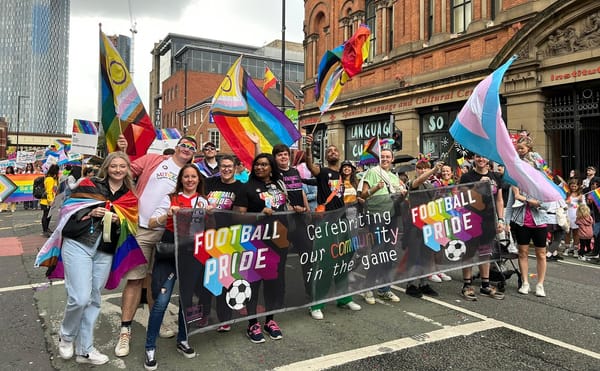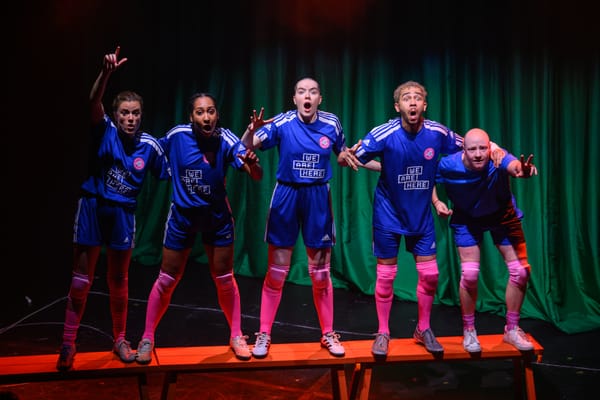FIFA, Qatar, OneLove and the FA: a guide to destroying trust with the LGBTQ+ community
As a gay football fan, this World Cup is somewhat of a mindfuck.
I love the World Cup, its dramas, its emotion. But how can you enjoy something fully, when you know its existence legitimises hate and human rights abuse?
One small solace I had was that at least the English FA was willing to show solidarity with the LGBTQ+ community. Harry Kane was to wear a ‘OneLove’ captain’s armband featuring a rainbow. This felt like the bare minimum. It was a small gesture, one seemingly designed to avoid FIFA castigation: the vague OneLove moniker deliberately avoiding specific critique of Qatar’s hateful laws against homosexuality and repressive attitudes to women’s rights. The rainbow flag was even deliberately adapted so as to not bear specific resemblance to the official pride flag.
So, a small gesture. But nonetheless something — a defiant gesture under the spotlight.
This morning’s reversal of that plan was a disgrace. The FA reneged on its plan for Kane to wear the armband. Many other national associations followed.
I’m disgusted. I’m fuming. Not just at FIFA, though it goes without saying that FIFA is enabling an awful regime and devaluing the sport billions of people, and millions of queer people, love in the process.
But the FA too. I’ve seen plenty of criticism of FIFA, but the FA should bear blame too. It’s shown itself to be spineless and cynical, pursuing the path of least resistance on a matter that necessitates boldness and backbone.
You simply cannot commit to protest unless you are willing to pay a price, to sacrifice something. Otherwise it’s worthless. It’s especially baffling when the price is reportedly as measly as a yellow card: a punishment that doesn’t even deter players from diving. And reports that Kane could’ve been banned for a game don’t make it any more acceptable to me either.
Are we really to believe that The FA announced its participation in this initiative thinking that FIFA and the Qatari organisers would simply nod it through? And if they did, why has no one got the sack for failing to foresee such an obvious eventuality?
I’m also disappointed — though not necessarily angry — with the England players. I had been hopeful that Kane might defy orders and wear the OneLove armband anyway.
Footballers over the last few years have shown that they are far more willing to get involved in social issues than ever before. And on the issue of LGBTQ+ rights, Kane has supported the rainbow laces campaign. The dressing room features prominent LGBTQ+ allies Jordan Henderson, Conor Coady and Kalvin Phillips. I’d hoped they would be forceful in their dissent against the u-turn. But apparently not.
Players have shown that while they can use their platform for good, they’re not yet able to step up when the chips are down.
I get that it’s not easy. I get that the football team is only at the World Cup to give themselves the best chance of winning. Anything that jeopardises success must be thoughtfully considered. But, though it’s a cliché, it’s bigger than that.
Sportswashing — the use of sport to improve the reputations of tarnished regimes — is best combated by drawing attention to the fact that sportswashing is happening. The BBC did a great job in its opening programme by dominating build up with talk of the treatment of migrant workers in Qatar, the scandals surrounding the awarding of the World Cup in the first place and, yes, LGBTQ+ rights.
The only way for the FA to emerge untainted from attending the Qatar World Cup in the first place was to use the global platform to send a message, to draw attention that Qatar is using football to sanitise its atrocities. Had it done that, had it accepted the consequences of protest, it would’ve been seen as a leader. It’d have once again shown sport’s ability to affect change.
But it hasn’t, and now we’re worse off than before. It would’ve been better to never promise any protest at all.
In one fell swoop, the FA has destroyed any trust left with the LGBTQ+ community, at a time when we need the FA to understand the struggle more than ever, and fight for change.
The FA has shown weakness in the face of adversity. And we won’t forget it.



